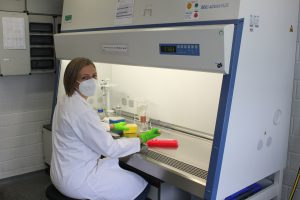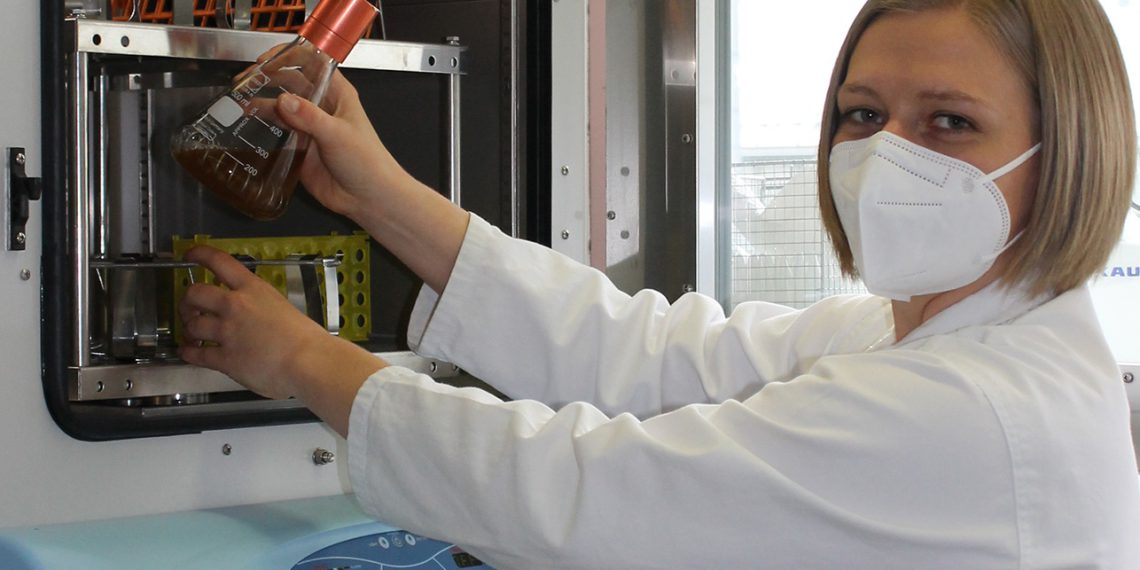Combining an efficient electrochemical process with the production of high-quality substances by enzymes and microorganisms is the goal of a still young research approach, bioelectrosynthesis. Prof. Dr. Frank Hahn, head of a research group for organic chemistry at the University of Bayreuth, wants to advance this approach in the future in the field of polyketides, a substance class of enormous importance in pharmacy and biomedicine. To this end, he will receive funding of around one million euros from the Volkswagen Foundation over the next seven years as part of the “Momentum” initiative.
Bioactive polyketides are natural substances that are used, for example, as powerful antibiotics, cancer drugs and active agents to combat parasites. Although they have very different structures, they have one thing in common: they are produced by special enzymes called polyketide synthases. Prof. Dr. Frank Hahn has been researching these enzymes for many years in order to understand their functions more precisely and to be able to use them for biotechnological applications.
 But polyketide synthases are of growing interest to researchers not only with regard to the production of pharmacologically relevant natural products. They are currently coming more and more into focus when it comes to the production of a variety of other valuable chemical products, such as fine chemicals. Polyketide synthases can potentially make an important contribution to replacing processes currently still based on oil and gas in the chemical and pharmaceutical industries with more sustainable alternatives. The research agenda funded by the Volkswagen Foundation is now targeting a completely new form of biotechnological application of polyketide synthases: The starting point is bacteria capable of electrosynthesis. The idea is to enable them to absorb sustainably generated electricity and CO2 from their environment and, precisely by doing so, to form certain small molecules. These can then be used by polyketide synthases as building blocks for drugs and chemicals.
But polyketide synthases are of growing interest to researchers not only with regard to the production of pharmacologically relevant natural products. They are currently coming more and more into focus when it comes to the production of a variety of other valuable chemical products, such as fine chemicals. Polyketide synthases can potentially make an important contribution to replacing processes currently still based on oil and gas in the chemical and pharmaceutical industries with more sustainable alternatives. The research agenda funded by the Volkswagen Foundation is now targeting a completely new form of biotechnological application of polyketide synthases: The starting point is bacteria capable of electrosynthesis. The idea is to enable them to absorb sustainably generated electricity and CO2 from their environment and, precisely by doing so, to form certain small molecules. These can then be used by polyketide synthases as building blocks for drugs and chemicals.
Producing high-value chemical and pharmaceutical products using polyketide synthases in bacteria capable of electrosynthesis is an entirely new field of application for bioelectrosynthesis, or BES.
“Bioelectrosynthesis is increasingly seen by international experts as an important element of a future bioeconomy. Indeed, our new research program, funded by the Volkswagen Foundation, combines a variety of bioeconomic aspects: the efficient use of renewably generated electricity, the fixation of CO2, and sustainable production of important chemical compounds. The results are also expected to be of interest to industrial companies offering products and services in areas of chemistry, pharmacy or biotechnology.”
- Prof. Dr. Frank Hahn, head of a research group for organic chemistry at the University of Bayreuth
With its “Momentum” funding initiative, the Volkswagen Foundation addresses scientists* who have held their first lifetime professorship for three to five years. Longer-term funding is intended to give them the opportunity to develop a creative, promising research agenda for the further strategic development of their professorship and to implement it in the long term.

















